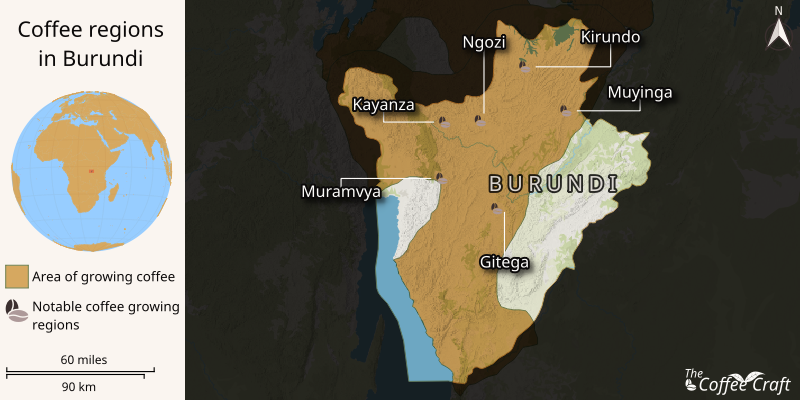Burundi coffee, known for its bright acidity and fruity complexity, reflects the dedication of its smallholder farmers and the unique terroir of its high-altitude regions. This article explores the history, production, and unique characteristics of Burundi coffee, offering readers a glimpse into what makes it a rising star in the specialty coffee world.
Table of Contents
The Journey of Burundi Coffee: History and Evolution
Colonial Beginnings
Coffee was introduced to Burundi during Belgian colonial rule in the 1920s. By the 1930s, farming coffee became mandatory, laying the foundation for its agricultural significance.
Challenges Overcome
Political instability and civil conflict shaped Burundi’s coffee story, along with logistical challenges from its landlocked geography. Despite these obstacles, the country has emerged as a producer of high-quality Arabica coffee.
Specialty Coffee Movement
The pivotal shift came in 2008, when Burundi embraced the specialty coffee sector. Direct trade and traceability opened doors to international markets, showcasing Burundi’s diverse coffee-growing regions and their unique profiles.
What Makes Burundi Coffee Unique?
Taste Profile of Burundi Coffee Beans
Burundi coffee beans are celebrated for their bright acidity, fruity notes, and clean, vibrant flavors. Depending on the region, profiles range from floral and citrusy to chocolaty and nutty, making these beans a favorite among coffee connoisseurs.
The Role of Terroir
Burundi’s high-altitude regions and volcanic soils provide the perfect environment for cultivating coffee. This unique terroir significantly contributes to the beans’ complex and diverse flavor profiles.
Smallholder Farmers: The Backbone of Coffee in Burundi
Burundi’s coffee production relies heavily on smallholder farmers who typically cultivate coffee on small plots. Their dedication and sustainable practices ensure the production of specialty-grade coffee.
Key Coffee-Growing Regions in Burundi
Kayanza: Home to Award-Winning Coffees
Kayanza stands out for its high altitude and exceptional quality. Burundi Kayanza coffee is noted for its bright acidity and fruit-forward flavors, consistently earning accolades on the international stage.
Ngozi: Complex and Floral Coffees
Ngozi produces coffees with complex flavor profiles, featuring floral and fruity notes. This region’s offerings are sought after for their aromatic and well-balanced brews.
Gitega: Bright and Vibrant Coffees
As Burundi’s second-largest coffee-producing region, Gitega is known for bright acidity and lively, fruity undertones, offering vibrant brews that captivate the palate.
Other Notable Regions
Regions like Muramvya, Kirundo, and Muyinga also contribute to Burundi’s coffee reputation, each offering unique characteristics from balanced sweetness to full-bodied richness.

Production Process: From Bean to Cup
Harvesting by Hand
Burundi’s smallholder farmers carefully pick ripe coffee cherries by hand, ensuring only the best beans make it to the next stage.
Washing Stations and Processing
The coffee cherries are processed at washing stations, where meticulous methods preserve their quality. This step is vital for the beans’ clean and vibrant flavors.
Quality Control and Traceability
Burundi emphasizes traceability and quality control, ensuring specialty-grade beans that appeal to global buyers. Each lot can often be traced back to its washing station.
Burundi Coffee on the Global Stage
Export Growth and Recognition
Burundi has steadily earned its place among specialty coffee producers. The growth in exports reflects increasing global appreciation for its high-quality beans.
International Awards and Prestige Cup
Burundi coffees have shone in international competitions, with events like the Prestige Cup highlighting the country’s dedication to quality and innovation.
Why Burundi Coffee Should Be on Your Radar
For Coffee Enthusiasts
Burundi coffee offers a symphony of flavors that makes it a must-try for specialty coffee lovers. From its fruity complexity to vibrant acidity, it’s an experience in every cup.
Ethical and Sustainable Practices
The country’s focus on supporting smallholder farmers and eco-friendly methods ensures that each purchase contributes to ethical and sustainable practices.
Conclusion
Burundi coffee is a testament to resilience, tradition, and excellence. From the lush highlands and volcanic soils to the dedication of its farmers, every cup tells a story of hard work and passion. Whether you’re savoring the vibrant notes of Burundi Kayanza coffee or exploring other regional profiles, one thing is certain: Burundi coffee is a rising star that deserves a place in every coffee lover’s repertoire.
